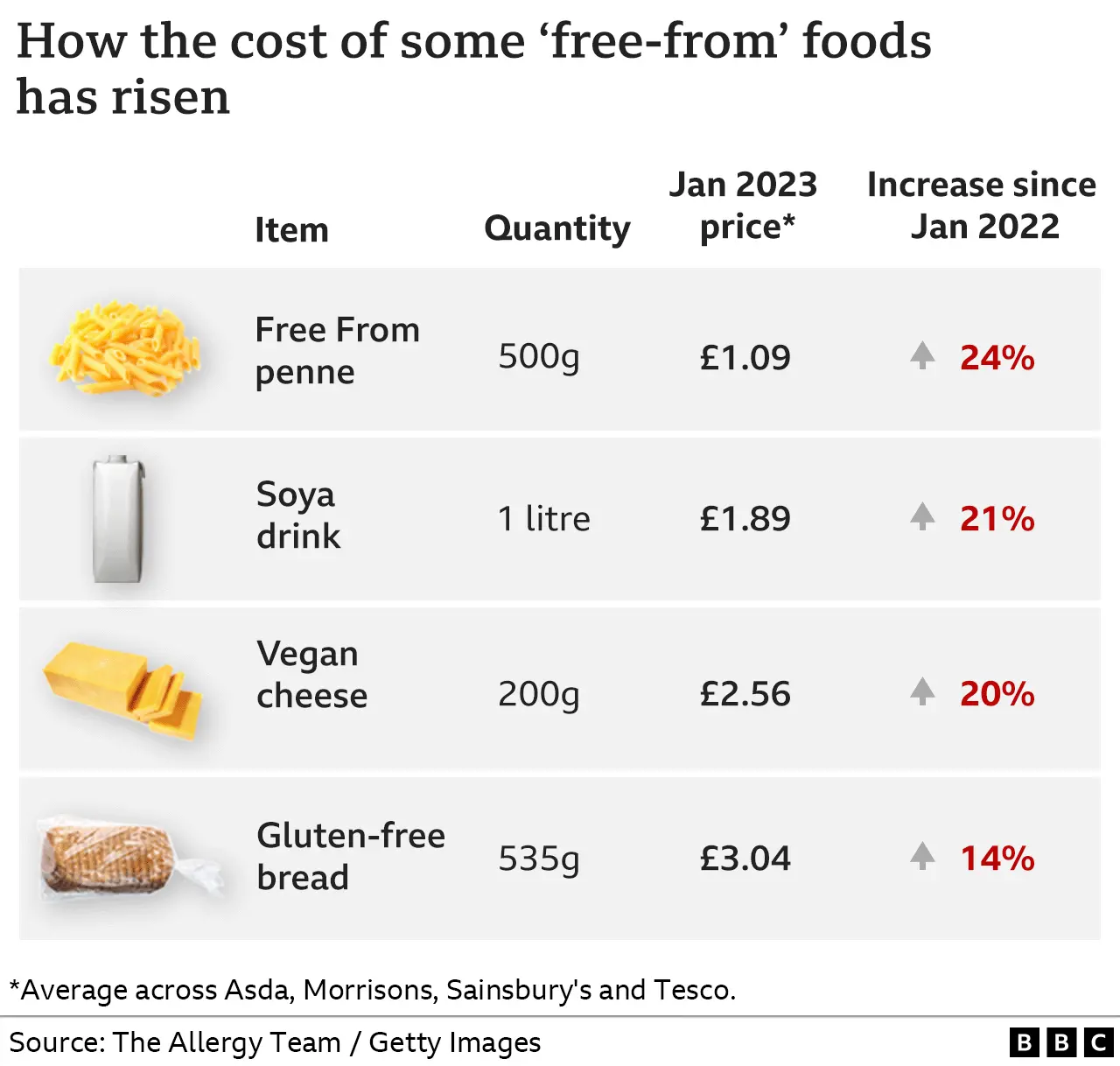Cost of living with food allergies becoming 'unbearable'
 Lynch Family
Lynch FamilyFood prices are rising for families across the country. But for some, the costs are even higher.
Nadia Lynch's four-year-old daughter Evy is severely allergic to dairy, and exposure to a minute amount could be life threatening.
The family buy pea milk as an alternative, chosen for its high calcium content. But at £2 per litre, it is also roughly 50% more expensive than cow's milk.
Families with restricted diets are now paying up to 73% more for their supermarket shop than those who do not need to buy "free from" products, according to analysis by The Allergy Team.
The online community supporting people with food allergies tracked average basket values of common family foods such as bread, pasta, milk and cheese, and their alternatives.
It found that gluten-free penne pasta at Morrisons jumped by 125% in 12 months, from 60p in January 2022 to £1.35 this month.
In Sainsbury's, Nurishh Vegan Cheddar Style Slices Cheese Alternative increased by 67%, from £1.50 to £2.50, outside of promotions.
And Alpro Growing Up Soya Milk increased by 27% at Asda from £1.50 to £1.90.
Plant-based milks, cheeses and yoghurts can be crucial sources of calcium and Vitamin D for children on restricted diets.
'A matter of life or death'
Food allergy affects between 3 and 6% of children in the developed world, according to the British Society for Allergy & Clinical Immunology (BSACI).
In the UK, an estimated two million people are living with a diagnosed food allergy, and 600,000 with coeliac disease.
In December, the Food Standards Agency found that households with food hypersensitivity - food allergy, intolerance and coeliac disease - spent an extra 14p for every pound compared to those who didn't need to buy alternative and "free from" products.
Shouldering the rising cost of these foods is "becoming unbearable" for many families, according to Sarah Knight, The Allergy Team's founder, who has two children with severe allergies.
"When your supermarket shop is already so costly, increases in food prices hit families living with food allergy even harder," she told the BBC.
"I don't have any choice but to buy more expensive 'free from' foods for my family. For my children it's a matter of life or death."
 Sarah Knight
Sarah KnightBetween 2014 and 2021, the number of 11- to 18-year-olds needing hospital treatment for severe allergic reactions increased by 85.5% from 214 to 397, according to NHS digital data.
Hospital admissions for severe allergic reactions across all age groups increased by 28.8% during the same period.
'May contain' labelling
Food costs including milk and cheese are rising at their fastest rate since 1977, increasing by 16.8% in the year to December 2022, according to the Office for National Statistics (ONS).
Families shopping for restricted diets are particularly vulnerable to price rises as supermarkets do not offer value ranges of "free from" products, says Carla Jones, CEO of the charity Allergy UK.
Current labelling practices restrict choice for these families even further, she added, saying: "'May contain' statements don't show a true reflection of the ingredients included and are more helpful to the manufacturer than to the allergic consumer.
"The sheer scale of the problem merits a meaningful revision of food labelling to open up food choices beyond the 'free from' fixtures for many families."
Cutting back on treats
The Lynch family are now being forced to cut back on treats to accommodate the rising cost of keeping Evy healthy.
"Everything is extortionate. We pay £2.75 for a tiny block of cheese, it is ridiculous," Ms Lynch told the BBC.
"We have to go to different shops looking for individual products, and we have to buy in bulk."
She added: "Vegan pizza costs a fortune when you compare it to the dairy ones.
"Two vegan chocolate pots are now £2.50 - they are delicious but we just can't afford to buy it now."

Does it have to be 'free from'?
But why are "free from" products more expensive?
It mainly comes down to the strict production processes.
The claim "free from" should only be used following a rigorous assessment of the ingredients, process and environment, according to guidance from the Food and Drink Federation.
"Free from" producers also cater to smaller markets, and are less likely to be able to benefit from economies of scale.
While plant-based milks aren't always certified as "free from", manufacturers also face higher production costs, which are passed on to the consumer, according to food commodity price analysts Mintec.
So how can families keep costs down?
Shopping around for allergy-friendly products without a "free from" label could save money.
Just look carefully at the ingredients and allergen labelling, says Ms Knight. Generally dry foods such as cereals, cereal bars, chocolate, biscuits and nuts are at greater risk of cross-contamination with allergens, according to Allergy UK.
Consider swapping more expensive options like gluten-free pasta, for cheaper alternatives like potatoes.
Buying in bulk directly from the supplier, and making the most of supermarket promotions, can also help cut costs.
Donating "free from" foods, such as plant-based UHT milk and gluten-free pasta or flour, to your local food bank can also help struggling families on restricted diets, says Allergy UK.
Coeliac patients can access gluten-free products on prescription in some parts of the UK. Formula-fed infants with a dairy allergy can also access specialist dairy free formula on prescription.
A spokesperson for Morrisons said the supermarket was working hard to keep prices down during an "unprecedented period of inflation".
A Sainsbury's spokesperson said the supermarket was committed to offering customers "great choice and value" and would continue to invest in their "free from" range in 2023.
The BBC approached ASDA and Tesco for comment.
